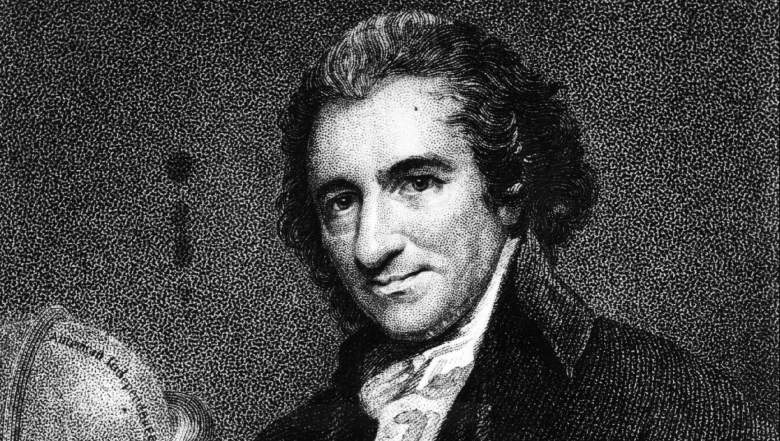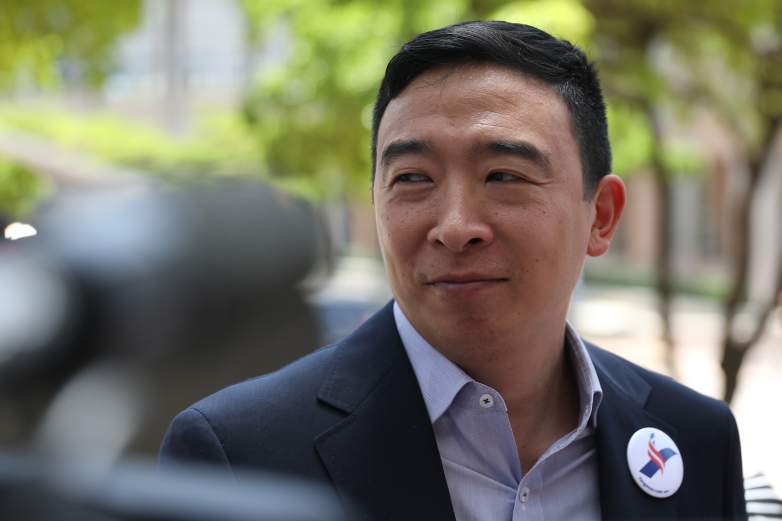
Getty Thomas Paine
2020 Presidential candidate Andrew Yang will take the stage tonight for a chance to officially solidify himself as an outside threat in the 2020 Democratic primary.
Yang’s main policy proposal is to provide every American citizen who wants it a Universal Basic Income (UBI) of $1,000 dollars a month. He calls the proposal the Freedom Dividend.
“Andrew would implement a Universal Basic Income, ‘the Freedom Dividend,’ of $1,000/month, $12,000 a year for every American adult over the age of 18,” Yang’s campaign website reads.
When asked about the legitimacy of UBI, Yang points to major political and economic figures in American history who were advocates of Universal Basic Income. Some of those figures include Martin Luther King Jr. and Milton Friedman. Yang even points to the state of Alaska as a success story of basic income.
Another major American figure who was a proponent of Universal Basic Income was founding father Thomas Paine.
Paine Was an Advocate of Social Dividends from Shared Resources

Getty Andrew Yang
Paine who thought, “the earth, in its natural, cultivated state was, and ever would have continued to be, the common property of the human race,” also shared the belief that the wealth captured by society should be returned to such society.
“To understand what the state of society ought to be, it is necessary to have some idea of the natural and primitive state of man; such as it is at this day among the Indians of North America. There is not, in that state, any of those spectacles of human misery which poverty and want present to our eyes in all the towns and streets in Europe,” Paine wrote in response to the way different societies look at poverty in Agrarian Justice.
Many consider Paine’s Agrarian Justice as one of the first texts to advocate for a social security net.
Paine Was Inspired by the Iroquois’ Way of Life
Paine’s inspiration for a social security net derived from his observations and relationships with the farming Native American tribe – the Iroquois.
“Cultivation is at least one of the greatest natural improvements ever made,” Paine wrote in Agrarian Justice following it up with:
…it has dispossessed more than half the inhabitants of every nation of their natural inheritance, without providing for them, as ought to have been done, an indemnification for that loss, and has thereby created a species of poverty and wretchedness that did not exist before.
A quote that can be relayed to today’s society, as Andrew Yang likes to use a business analogy to drive home a very similar point – the United States is generating revenue off of the backs of its shareholders (its citizens) therefore the shareholders deserve a dividend.
Paine Had a Plan for His ‘Citizens Dividend’
A “Citizens Dividend” is what Paine deemed it, as the concept derives from his many words in Agrarian Justice.
“Men did not make the earth. It is the value of the improvements only, and not the earth itself, that is individual property. Every proprietor owes to the community a ground rent for the land which he holds,” Paine wrote.
According to Investopedia, the philosopher and founding father wanted to give a “groundrent” of £15 to everyone over 21-years-old, and £10 for everyone over 50.
He also rang the bell similar to Martin Luther King Jr. and Milton Friedman, as he wanted to the dividend to be universal in order to promote equality. He said, “every person, rich or poor,” should receive the payments “to prevent invidious distinctions,” per Investopedia.